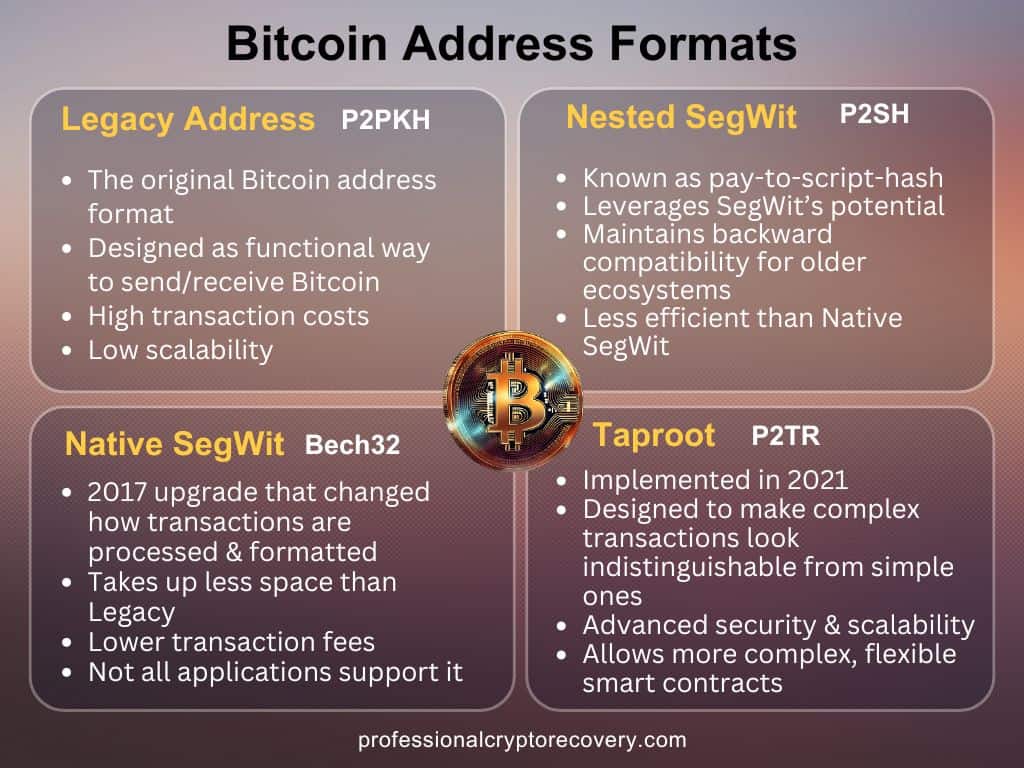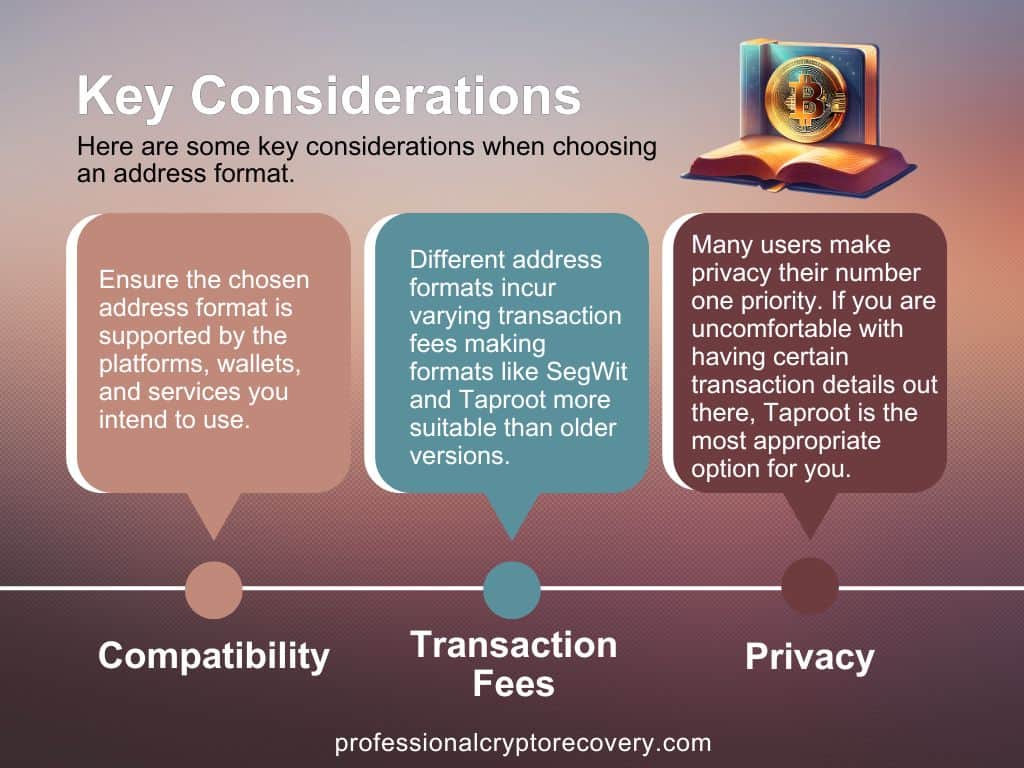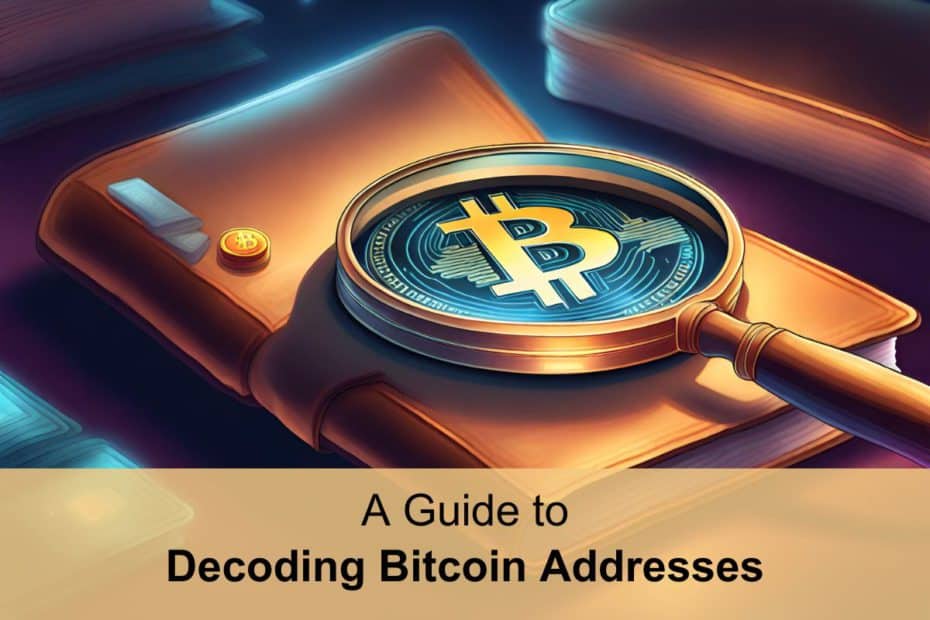Bitcoin and Bitcoin wallets have come a long way since the days of Bitcoin-Qt and paper wallets. This is largely due to the blockchain undergoing security and performance updates over the years.
So, many modern wallets are designed to support the generation of different address formats to ensure compatibility and interoperability with the evolving network.
Each format has its own strengths and weaknesses, and some formats are more modern than others. The wallet’s owner also typically has agency over which format they use.
How do you, the user, navigate this complex world of address formats, and what problems might you expect or run into?
How Bitcoin Address Formats Work
Cryptocurrencies work using a combination of two cryptographic keys: public and private. The latter is the key that proves ownership of the funds associated with a wallet’s particular address. It is used to sign transactions before they are broadcasted to the blockchain for confirmation.
The wallet address mentioned above is the public key. It’s what other people use to send you crypto and vice versa. If you think of your crypto wallet as a safe, your public key (wallet address) is a label that identifies your safe. Your private key, on the other hand, is the combination that unlocks this safe.
The wallet address is what can be generated in multiple formats from the same private key. Think of these different formats as different labels, but all pointing to separate safes, i.e., your Bitcoin wallet.
You can generate and share different address formats with others to receive Bitcoin. These formats do not represent entirely new public-private key pairs. They are instead, different public keys derived from the same private keys. This means that you have multiple wallets in the same application, each holding its own funds.
All addresses correspond to the same private key and wallet. So, any Bitcoin sent to these addresses will be accessible to the user.
But why do these formats exist?
Well, the Bitcoin protocol evolves as new features and improvements are introduced through Bitcoin Improvement Proposals (BIPs). By supporting multiple address formats, wallets ensure that they remain compatible with future changes and updates to the protocol. This enables users to take advantage of new features and enhancements as they are introduced
Bitcoin Address Formats Explained

There are four address formats supported by most modern Bitcoin wallets:
- Legacy Address (P2PKH)
Legacy address, or the pay-to-pubkey-hash (P2PKH), is the original Bitcoin address format. It was designed with the main focus of establishing a functional way to send and receive BTC.
With little in the way of efficiency, transaction costs are highest using this format. It also suffers from limited scalability because it doesn’t fully leverage the improvements of newer technologies.
This means Legacy is the least used address format. However, applications are encouraged to support this format to be compatible with older Bitcoin wallets.
P2PKH addresses start with the number “1.” They are case-sensitive, containing both upper and lowercase characters.
Example: 1BybYRcBQDf9TW9rFj57okTNmYEcicjya1
- Native SegWit (Bech32 – P2WPKH)
Segregated Witness (SegWit) is a 2017 protocol upgrade that changed how Bitcoin transactions are processed and formatted. It processes transaction data to take up less space, allowing more transactions to fit in a single block. This has the same effect as increasing block capacity, which leads to lower transaction fees.
SegWit introduced its own kind of address format, Native SegWit, also known as Bech32. The format is focused on efficiency and scalability to solve the limitation of P2PKH. Its addresses generally incur lower transaction fees than other formats.
SegWit is an optional upgrade on the Bitcoin blockchains. Some people use it while others do not. Thus, not all applications support SegWit addresses. These addresses start with “bc1q” and are case-insensitive.
Example: bc1q7xmhe8yuexxpdy4nvtyx2x89q6hvsnw6ylc7rf
- Nested Segwit (P2SH)
Nested SegWit, or pay-to-script-hash (P2SH), is a transaction format introduced before Native SegWit had been fully developed and adopted. It is designed to leverage the potential of SegWit while maintaining backward compatibility with the older ecosystem. As such, it supports sending to Legacy (P2PKH) and Native SegWit (Bech32) addresses.
Nested SegWit offers some improvements in transaction size and costs over Legacy addresses. However, it is less efficient than Native SegWit because it is not as fully optimized. It also involves some additional steps due to scripting. This makes it more complex than its aforementioned alternatives.
P2SH addresses typically start with the number “3.” They can contain both lower and uppercase characters and are case-sensitive.
Example: 3BhCQ9eYib5ZxP3UjxiFbwsSqPbqjY5zAR
- Taproot (P2TR)
Taproot is a major privacy-focused Bitcoin upgrade implemented on the network in late 2021. It is designed to make complex transactions, such as those involving smart contracts, look indistinguishable from simple, regular transactions.
The upgrade also introduces more advanced security and scalability improvements. When combined with certain technologies, it allows for more complex and flexible smart contracts. As such, Taproot addresses incur lower transaction fees and benefit from enhanced privacy and flexibility.
They are also known as pay-to-taproot (P2TR) and are a modified version of Bech32. Starting with the prefix “bc1p,” they are case-insensitive.
Example: bc1p5d7rjq7g6rdk2yhzks9smlaqtedr4dekq08ge8ztwac72sfr9rusxg3297

Important considerations
Many modern Bitcoin wallets give you the ability to select the address format you prefer based on your specific needs, preferences, and compatibility requirements. You can do this from the settings section or when generating a new address for receiving funds.
Here are some key considerations when picking an address format:
- Compatibility: Ensure that the chosen address format is supported by the platforms, wallets, and services you intend to use. Not all platforms support all address formats, so it’s crucial to verify compatibility to avoid issues with sending or receiving Bitcoin.
- Transaction Fees: Different address formats incur varying transaction fees. Generally, most users hope to incur lower transaction fees. This makes the latest formats, like SegWit and Taproot, more suitable than older ones, like Legacy.
- Privacy: Some users care about privacy above all else. Due to the transparent nature of Bitcoin, some people are uncomfortable with having certain transaction details out there. In this case, Taproot is the appropriate address format.
Potential Problems
You might encounter a few issues when dealing with multiple wallet address formats. These are commonly compatibility issues.
For example, not all platforms support every address format. Issues may arise if you’re using an address type that the other party doesn’t recognize.
Another problem involves balances. Your private key might be generating addresses with zero BTC, even though you’re sure you should have some.
So, what do you do?
- Double-check everything
Make sure you are inputting your private key correctly. This is because even a single wrong character will generate totally unrelated addresses with no connection to your funds, showing a zero balance. Thus, it is important to thoroughly re-verify your private key.
You should also check your transaction history using a block explorer. It’s possible that your funds were recently moved or there is a pending transaction that hasn’t been confirmed.
- Rescan wallet
The issue might also be a result of your wallet not being fully synchronized with the Bitcoin network. Thus, it doesn’t accurately reflect your current Bitcoin (BTC) balance.
You want to restart your wallet and allow it sufficient time to sync with the network. Some Bitcoin wallets also allow you to rescan the network for transactions associated with your private keys.
Depending on network congestion and transaction fees, it may take some time for the transaction to be confirmed and reflected in your wallet balance.
- Seek Professional Help
If you still can’t account for your missing funds, you might want to contact support. Many of today’s wallets have a dedicated support team that helps users troubleshoot wallet issues.
However, wallet support teams are often of little help. So, you might want to look for a wallet recovery professional. This is someone who specializes in helping affected crypto users recover access to their wallets and/or their crypto funds.
Contact a Wallet Recovery Professional Today
Professional Crypto Recovery (PCR) is a wallet recovery firm operated by a specialist with more than 20 years in IT. Boasting a proven record of success, PCR is here to provide you with the best possible service.
Our model is designed to help you get back your funds quickly, safely, and affordably, with some of the lowest fees in the market. Contact us today to book your free consultation.
